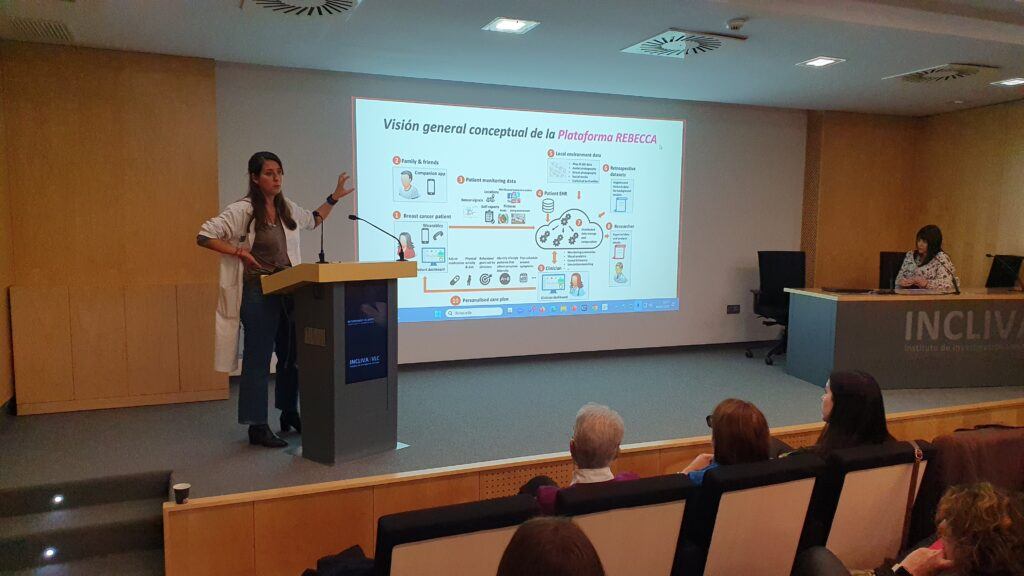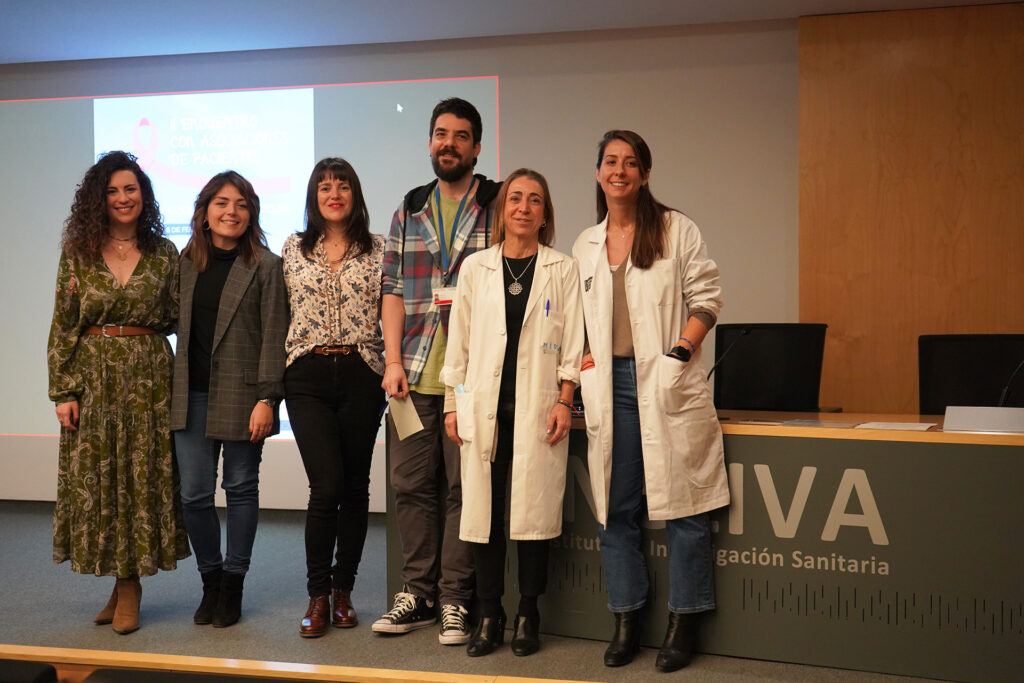INCLIVA and the Clinical Hospital of València held the second Meeting with breast cancer patient associations to showcase the latest advances in research
Researchers emphasise the importance of adopting healthy lifestyle habits regarding nutrition and physical exercise.
València, February 6, 2024. The INCLIVA Health Research Institute, together with the Breast Cancer Unit of the University Clinical Hospital of València, organised a meeting with patient associations to showcase the latest advances in research in this field, understand their perceptions firsthand, and address their doubts and concerns about the disease.
The researchers from the Breast Cancer Biology Research Group at INCLIVA and professionals from the Clinical Hospital explained at the meeting their latest research efforts, focusing on the importance of adopting healthy lifestyle habits regarding nutrition and physical exercise.
The participants were the doctors Begoña Bermejo, Marta Tapia, María Teresa Martínez, Cristina Hernando, and Juan Miguel Cejalvo from INCLIVA, as well as the nurse Cristina Tébar.
After being welcomed by Dr. Bermejo introducing the event, Dr. Tapia highlighted the benefits of physical exercise and good nutrition in breast cancer patients. In this regard, she stated that physical exercise is “a great ally against this type of cancer and there is evidence of its relationship with increased patient survival. Therefore, physical exercise is always recommended, before, during, and after oncological treatment, as it improves quality of life; reduces some of the effects of treatments, even those that occur long-term after their administration, such as fatigue and anxiety; helps control pain; prevents osteoporosis; reduces the risk of lymphedema; promotes treatment adherence; and prevents other neoplasms.” In addition, Dr. Tapia emphasised “the importance of adequate nutrition, avoiding tobacco and alcohol consumption, to ensure a healthy lifestyle and the well-being of patients.”
Cristina Tébar elaborated on her project, conducted under the supervision of Doctors Juan Miguel Cejalvo and Begoña Bermejo. The project aims to validate a tool designed for the objective assessment of alterations in the sexual health of women under 45 who have successfully battled breast cancer and are presently undergoing hormonal therapy. Furthermore, Tébar discussed the project’s focus on examining how these alterations impact the overall quality of life for these individuals.
In her intervention, Dr. María Teresa Martínez highlighted that “the advancement in the knowledge of the human genome has allowed the identification of germline mutations in different genes involved in the onset of hereditary breast cancer syndrome.” She added that “Breast cancer is the most common tumour in women, and family history is the most important risk factor. Although germline mutations in the BRCA1 and BRCA2 genes are the most common ones associated with breast and ovarian cancer syndrome, other genes of high and moderate penetrance have also been described that can modify the risk for breast cancer.” Furthermore, Dr. Martínez pointed out that “the early identification of these high-risk families allows them to be attended to more specifically, from an individualised assessment of the risk of developing cancer to strategies for prevention, treatment, and appropriate follow-up for their risks.” Therefore the recommendation for a genetic study should be made when there is a personal or family history of cancer susceptibility. She concluded that “the test can be interpreted appropriately, and the results will influence the diagnosis or medical or surgical treatment of the patient or their relatives at risk,”.
Dr. Cristina Hernando highlighted the significance of leveraging artificial intelligence in breast cancer research. In this regard, she referred to the European projects REBECCA and MELIORA, financed by the European Union’s research and innovation programs Horizon 2020 and Horizon Europe, in which INCLIVA participates. Dr. Hernando explained that REBECCA is based on a technological tool that allows obtaining information about the patient’s lifestyle – providing data related to their physical activity and diet, for instance, through smart devices (such as mobile phones, tablets, and smartwatches) to integrate it into their clinical history and, thus, better tailor their treatment. Regarding MELIORA, she said that its objective is to “reduce the risk of breast cancer through interventions on lifestyle with the support of artificial intelligence tools since it is known that 30% of cases can be prevented through modifiable risk factors.”
She also elaborated on the goals of the High Definition Medicine project, led by the National Cancer Research Center (CNIO), in which INCLIVA collaborates under the guidance of Dr. Bermejo. This initiative operates under the premise that the response of tumours and the tolerance to systemic oncological treatments may be impacted by numerous factors and variables. Through high-resolution techniques, the project aims to identify these factors and variables, ultimately enhancing the selection process for patients starting with systemic treatment.
Finally, Dr. Juan Miguel Cejalvo presented the structure, areas, and objectives of INCLIVA aimed at advancing precision medicine. This approach is increasingly adapted to the characteristics of each patient thanks to earlier diagnostics and more personalised, more effective treatments with fewer side effects. He thanked the associations and collaborating entities with INCLIVA for their contributions to promoting health research and conveying the patient’s perspective.
Bringing research closer to patients and patients closer to research
Patient meetings are a key element for INCLIVA to understand the experiences and concerns of those with the disease firsthand and transfer them to the laboratories, generating a bidirectional flow. The meeting with patient associations held in February, intended to become an annual meeting, was highly successful in terms of participation. The in-person capacity was reached, indicating the strong interest from patient associations in such events, which provide direct interaction with researchers.
In this second Meeting, breast cancer patient associations and collaborating entities participated with whom INCLIVA maintains close contact and contribute, through their assistance, donations, and collaboration, to promoting breast cancer research, such as AECC, the Spanish Association Against Cancer Metastasis, and Amunt against Cancer.
Engaging with patients in these ways aligns with INCLIVA’s goals in Responsible Research and Innovation (RRI). This approach aims to promote science that is more open, inclusive, transparent, and collaborative, ultimately bridging the gap between the scientific community and society. RRI is based on six principles: scientific education, gender equality, open access, governance, ethics, and citizen participation. Regarding increased citizen participation in science, RRI seeks to encourage more and more actors to be involved in the research process at every stage: from its inception to the development, and achievement of results, promoting so-called ‘citizen science’.
This text is an adapted translation from the original press release published by INCLIVA in Spanish.


